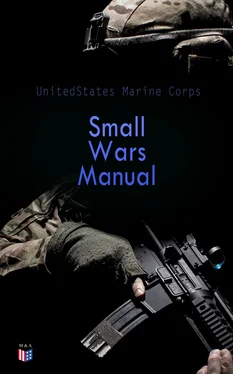1 ...6 7 8 10 11 12 ...17 e. This is the policy with which our troops are indoctrinated; a policy which governs throughout the period of intervention and finds exception only in those situations where a resort to arms and the exercise of a belligerent spirit are necessary. This mixture of combined peaceful and warlike temperament, where adapted to any single operation, demands an application of psychology beyond the requirements of regular warfare. Our troops at the same time are dealing with a strange people whose racial origin, and whose social, political, physical and mental characteristics may be different from any before encountered.
f. The motive in small wars is not material destruction. It is usually a project dealing with the social, economic, and political development of the people. It is of primary importance that the fullest benefit be derived from the psychological aspects of the situation. That implies a serious study of the people, their racial, political, religious, and mental development. By analysis and study the reasons for the existing emergency may be deduced; the most practical method of solving the problem is to understand the possible approaches thereto and the repercussion to be expected from any actions which may be contemplated. By this study and the ability to apply correct psychological doctrine, many pitfalls may be avoided and the success of the undertaking assured.
g. The great importance of psychology in small wars must be appreciated. It is a field of unlimited extent and possibilities, to which much time and study should be devoted. It cannot be stated in rules and learned like mathematics. Human reactions cannot be reduced to an exact science, but there are certain principles which should guide our conduct. These principles are deduced by studying the history of the people and are mastered only by experience in their practical application.
Table of Contents
The correct application of the principles of psychology to any given situation requires a knowledge of the traits peculiar to the persons with whom we are dealing. The individual characteristics as well as the national psychology are subjects for intensive study. This subject assumes increasing importance in minor operations. A failure to use tact when required or lack of firmness at a crucial moment might readily precipitate a situation that could have been avoided had the commander been familiar with the customs, religion, morals, and education of those with whom he was dealing.
1-12. Fundamental considerations.
Table of Contents
The resistance to an intervention comes not only from those under arms but also from those furnishing material or moral support to the opposition. Sapping the strength of the actual or potential hostile ranks by the judicious application of psychological principles may be just as effective as battle casualties. The particular methods and extent of the application of this principle will vary widely with the situation. Some of the fundamental policies applicable to almost any situation are:
1. Social customs such as class distinctions, dress, and similar items should be recognized and receive due consideration.
2. Political affiliations or the appearance of political favoritism should be avoided; while a thorough knowledge of the political situation is essential, a strict neutrality in such matters should be observed.
3. A respect for religious customs.
Indifference in all the above matters can only be regarded as a lack of tact.
1-13. Revolutionary tendencies.
Table of Contents
a. In the past, most of our interventions have taken place when a revolution was in full force or when the spirit of revolution was rampant. In view of these conditions (which are so often encountered in small wars) it may be well to consider briefly some of the characteristics of revolutions.
b. The knowledge of the people at any given moment of history involves an understanding of their environment, and above all, their past. The influence of racial psychology on the destiny of a people appears plainly in the history of those subject to perpetual revolutions. When composed largely of mixed races—that is to say, of individuals whose diverse heredities have dissociated their ancestral characteristics—those populations present a special problem. This class is always difficult to govern, if not ungovernable, owing to the absence of a fixed character. On the other hand, sometimes a people who have been under a rigid form of government may affect the most violent revolutions. Not having succeeded in developing progressively, or in adapting themselves to changes of environment, they are likely to react violently when such adaptation becomes inevitable.
c. Revolution is the term generally applied to sudden political changes, but the expression may be employed to denote any sudden transformation whether of beliefs, ideas, or doctrines. In most cases the basic causes are economic. Political revolutions ordinarily result from real or fancied grievances, existing in the minds of some few men, but many other causes may produce them. The word “discontent” sums them up. As soon as discontent becomes general a party is formed which often becomes strong enough to offer resistance to the government. The success of a revolution often depends on gaining the assistance or neutrality of the regular armed forces. However, it sometimes happens that the movement commences without the knowledge of the armed forces; but not infrequently it has its very inception within these forces. Revolutions may take place in the capital, and by contagion spread through the country. In other instances the general disaffection of the people takes concrete form in some place remote from the capital, and when it has gathered momentum moves on the capital.
d. The rapidity with which a revolution develops is made possible by modern communication facilities and publicity methods. Trivial attendant circumstances often play highly important roles in contributing to revolution and must be observed closely and given appropriate consideration. The fact is that beside the great events of which history treats there are the innumerable little facts of daily life which the casual observer may fail to see. These facts individually may be insignificant. Collectively, their volume and power may threaten the existence of the government. The study of the current history of unstable countries should include the proper evaluation of all human tendencies. Local newspapers and current periodicals, are probably the most valuable sources for the study of present psychological trends of various nations. Current writings of many people of different classes comprise a history of what the people are doing and thinking and the motives for their acts. Thus, current periodicals, newspapers, etc., will more accurately portray a cross section of the character of the people. In studying the political and psychical trends of a country, one must ascertain whether or not all news organs are controlled by one political faction, in order to avoid developing an erroneous picture of the situation.
e. Governments often almost totally fail to sense the temper of their people. The inability of a government to comprehend existing conditions, coupled with its blind confidence in its own strength, frequently results in remarkably weak resistance to attack from within.
f. The outward events of revolutions are always a consequence of changes, often unobserved, which have gone slowly forward in men’s minds. Any profound understanding of a revolution necessitates a knowledge of the mental soil in which the ideas that direct its course have to germinate. Changes in mental attitude are slow and hardly perceptible; often they can be seen only by comparing the character of the people at the beginning and at the end of a given period.
Читать дальше












